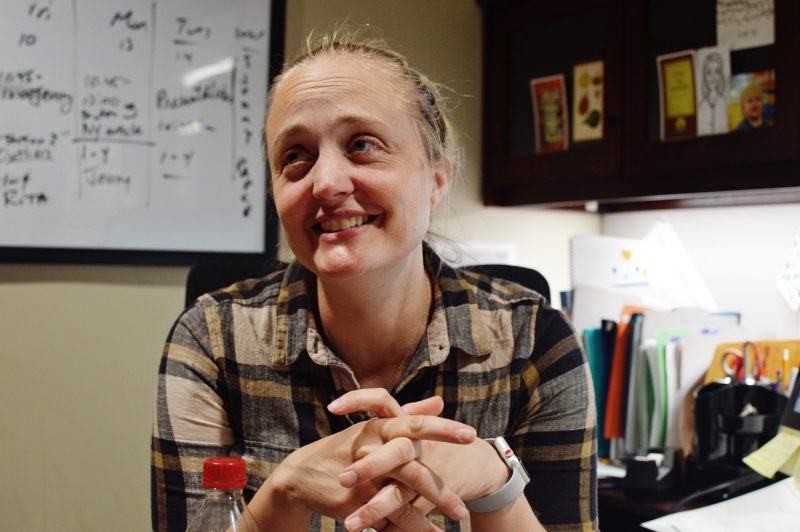Writing well and conveying a point can be difficult, but help and guidance is just around the corner. Located in the Tiger Learning Commons (TLC) on the main floor of the Coates Library, the Writing Center teaches students a variety of writing skills that will serve their college careers and beyond. It is open to all questions and ready to coach students to become better writers and better communicators.
Jennifer Rowe is going into her fourth year as the director of the Writing Center. When she arrives at Trinity, the first thing she does is pick up her iced coffee and settle into the TLC. She checks in with student accessibility services and with the academic coaches. She then checks in with junior Loretta Rodriguez, head organizer and writing tutor, and looks over the Writing Center’s schedule for the day.
In addition to being the head of the Writing Center, Rowe is also an instructor. She typically teaches two to three First Year Experience (FYE) courses, and teaches from around 10 a.m. to 1 p.m. before coming back for office hours and grading.
“So my job has a sort of 50 percent Writing Center and 50 percent teaching element,” Rowe said. “I’m always kind of shutting my door, letting the writing tutors go about their business, and I plan for class.”
Tutors at the Writing Center are selected at the beginning of the year. These students are recognized for their writing and teaching skills. Rowe explained that while she leaves in the afternoon, the tutors stay until about 10p.m., which enables the Writing Center to keep offering guidance past her departure time. Tutors are self-motivated and each find their own satisfaction in helping students thrive.
“I get to meet so many different students at the writing center and help them grow out of their insecurities about writing,” Rodriguez said. “I love working in a supportive environment alongside six other tutors who want to help students express their thoughts and ideas on paper.”
As far as how students get involved with the Writing Center as tutors, Rowe explained that she sometimes receives referrals from professors. Other applicants want to go into writing-intensive graduate programs or careers, like Tiffany Nguyen, another peer tutor for the Writing Center.
“At one point, I wanted to be an English teacher, so I wanted to get as much teaching experience as possible,” Nyugen said. “I [was] recommended by my FYE [professor] and ended up as [a] peer tutor for Jenny Rowe, who asked me to join the Writing Center.”
Students are also welcome to seek Rowe out themselves if they have a strength to bring to the Writing Center.
“[Victoria] Aarons, who is in the English department, started the Writing Center, and so she taught me a lot about how to find really good students,” Rowe said. “We advertise as well. So anybody at any time is welcome to send in an application.”
Once peer tutors are selected, they spend time at the Writing Center helping students overcome common road blocks in their assignments. Rowe described the number one thing that students come in for is difficulty starting a paper, or the fear of the white page. Typically, the question is “What do I want to say?”
Rowe explained that the writing tutors must help students generate some questions to first formulate and afterwards answer an argument supported by substantial evidence. They do thesis work with the students and ease the transition from high school to college writing, particularly for first-year students enrolled in FYE courses.
“We get a lot of papers summarizing material instead of analyzing it, so [we teach] students more in-depth of what the word analysis means,” Rowe said.
Rowe also sees many students coming in to have someone proofread their papers.
“We always use those experiences as teaching opportunities to empower the students to edit their own work. That’s our philosophy,” Rowe said.
To better educate students, the Writing Center is constantly evolving and implementing beneficial changes.
“This year, the big project [for the Writing Center] is that I want to get my students certified through the College Learning and Reading Association so that they have professional certification,” Rowe said. “We’re [also] looking at enhancing our tutoring for oral presentations, which often come from written work.”
Last year, the focus was on implementing the FYE awards, which will take place again this year. Near the end of semester, first-years are invited to submit a paper of their choosing from their FYE classes. The four winners and four honorable mentions receive cash prizes if their papers are selected by the judging committee.
When asked what the FYE committee looks for in first-year papers, Rowe said, “A lot of times it’s that the material is fresh and interesting. It’s a strong voice, it’s clarity of prose, it’s a solid argument. The papers aren’t necessarily always perfect, but they show so much promise. It’s a good way of recognizing those students early.”
For students interested in making an appointment online or learning more about the Writing Center, visit https://inside.trinity.edu/student-success/writing-center.







